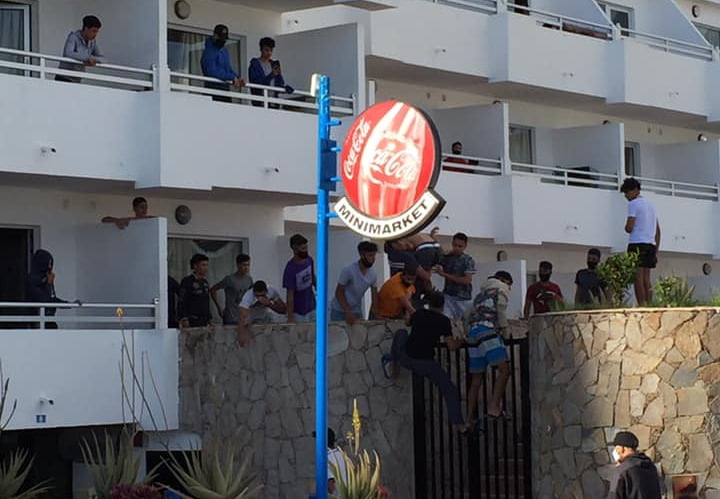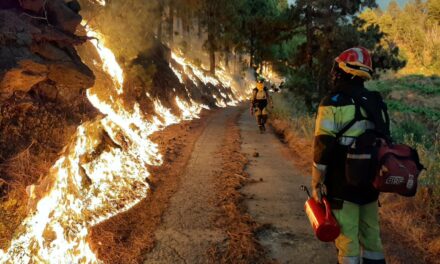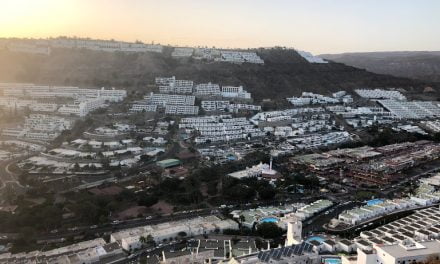The residents of Puerto Rico de Gran Canaria have complained for weeks about problems where migrant minors have been accommodated in the south western municipality of Mogán. The majority of the 800 or so unaccompanied children temporarily accommodated in the south, who arrived by boat last year, have been staying in empty tourist hotels in Mogán.
Over the last 3 months there have been serious concerns, in particular, regarding those who claim to be unaccompanied minors, and who yet appear and act as adults. With the evidence that has been gathered NGO’s, Police and Child Protection services have identified up to 300 individuals suspected of lying about their age who, in some cases, may in fact be well over the age of 25. There is almost the same number again, for whom there is reasonable doubt as to whether or not they are still minors. The Canary Islands Government is now prioritising those individuals for age assessment and bone testing.
At this moment, the Government of the Canary Islands is responsible for 2,652 migrants who arrived by boat over recent months and who claim to not be adults, however in three out of four cases the authorities have had no way to verify their age; specifically, 2016 individuals who have made the claim but without evidence, 1,575 of those are in the province of Las Palmas (Gran Canaria, Fuerteventura, Lanzarote or La Graciosa) and 395 are in the province of Santa Cruz de Tenerife (Tenerife, La Gomera, El Hierro or La Palma).
The General Director of Child Protection for The Canary Islands, Iratxe Serrano, explained, that the delays have built up particularly on Gran Canaria and Fuerteventura, the islands that have received the majority of arrivals by boat in recent months, and has been causing serious problems in several shelters and temporary accomodation facilities for minors.
The Regional Government, who have closely monitored the situation, is convinced that among those 2,016 individuals still to be examined there could be as many as 600 adults: for about half of whom, they admit, that there is reasonable doubt that they may be on the cusp of adulthood, around 18 years old, but that there is also anything up to 300 individuals in whom they have found “obvious physical signs” that they could well be “over 25 years old and sometimes over 30 and even over 40”.
These 300 suspected of being adults will have disguised themselves as minors to avoid deportation, Serrano says, and from what she understands it is these very same individuals who seem to be involved in “95 percent” of the incidents and altercations that have been taking place in centers being used to accommodate juveniles, acting as a negative influence on real children, because they are not subject to the same rules.
“Our centers and the NGOs that manage them are prepared to deal with children. Their professionals are very competent, but they cannot deal with uncles who obviously have gray hair,” says Serrado, who confesses that in her department they are “desperate” to deal with this problem, for which a solution is urgently needed.
The hold up is primarily on the island of Gran Canaria, where three factors have added to the slowing of tests pending, some for almost a year: the huge volume of migrant arrivals, the difficulties introduced by the covid pandemic and the excessive bureaucratic and administrative obstacles in carrying an age-determination bone test.
When it is suspected that any migrant who claims to be a minor is in fact over 18 years old, it is the job of the Immigration Prosecutor’s Office to order bone tests (consisting of a wrist X-ray and another dental scan).
This is the process that, by law, needs to occur: The Police request an appointment with the public health department; they then take the individual to a health centre, their results are collected, filed securely by the police and then delivered to the Institute of Legal Medicine, whose forensics team re-examine the alleged minor and give their final opinion of that individual’s age. For this reason, and to protect vulnerable minors this is not usually something that can be completed in a day.
In Santa Cruz de Tenerife, that system is working well and the tests are carried out within a maximum of three to four weeks, so that now there are only 395 cases still pending. In Las Palmas, however, there are huge bottlenecks in the processes prior to forensic intervention.
The General Directorate for the Protection of Children has tried to unblock these hold-ups by requesting authorisation from the Public Prosecutor’s Office (fiscalía público) to contract private clinics to carry out these bone tests, which was authorised. However, this measure was subsequently ruled out.
According to Iratxe Serrano, in the end the Canary Islands Health Service instead guaranteed that they will be able to carry out about 100 weekly tests in Las Palmas, to begin to reduce the long list of pending age test results, and so this led to a decision not to outsource the process to private clinics.
To try to increase the rate of testing, two other measures are now being taken: exceptionally, the NGOs that manage the centers will, themselves, now be allowed to take the minor, or presumed minor, to undergo the tests at a health clinic, although the results will always be delivered directly to the Police, to guarantee the chain of custody. Second, to more efficiently tackle the situation, priority will be given to cases in which there are serious doubts that the individuals are in fact under 18 years of age, postponing tests for those in which it is clearly evident that they are in fact children.
However, Serrano points out, that her department’s policy remains that all minors will have to be age-tested if there are no documents that can reliably identify them, even if they are small children, because each individual’s age is a basic piece of information that influences many facets of their lives including schooling , health care and, of course, to be able determine when they have legally become an adult.













